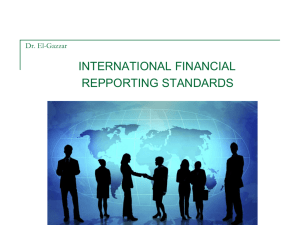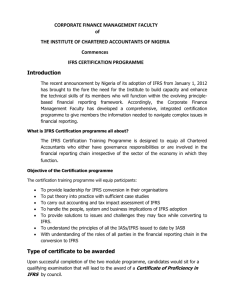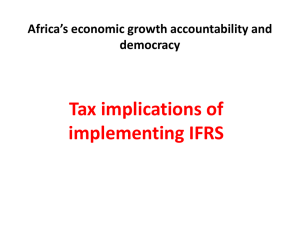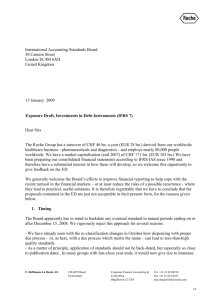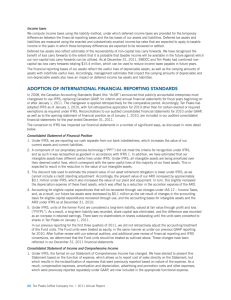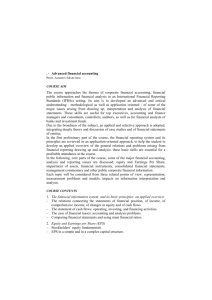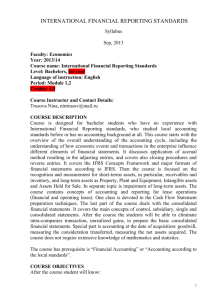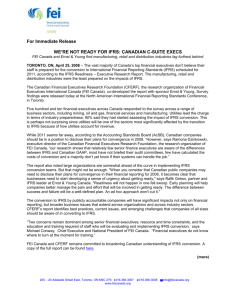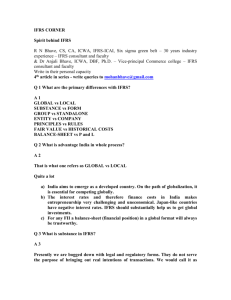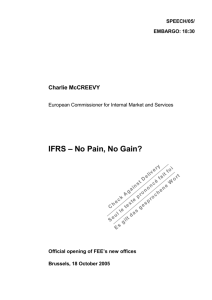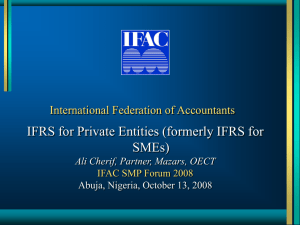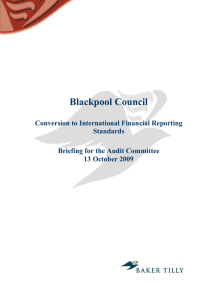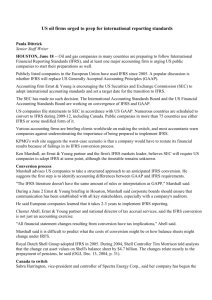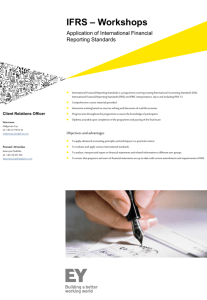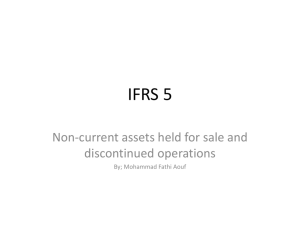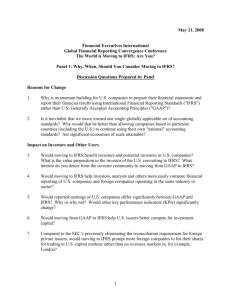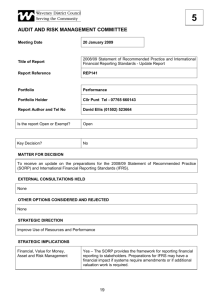implementation of international financial reporting standards
advertisement
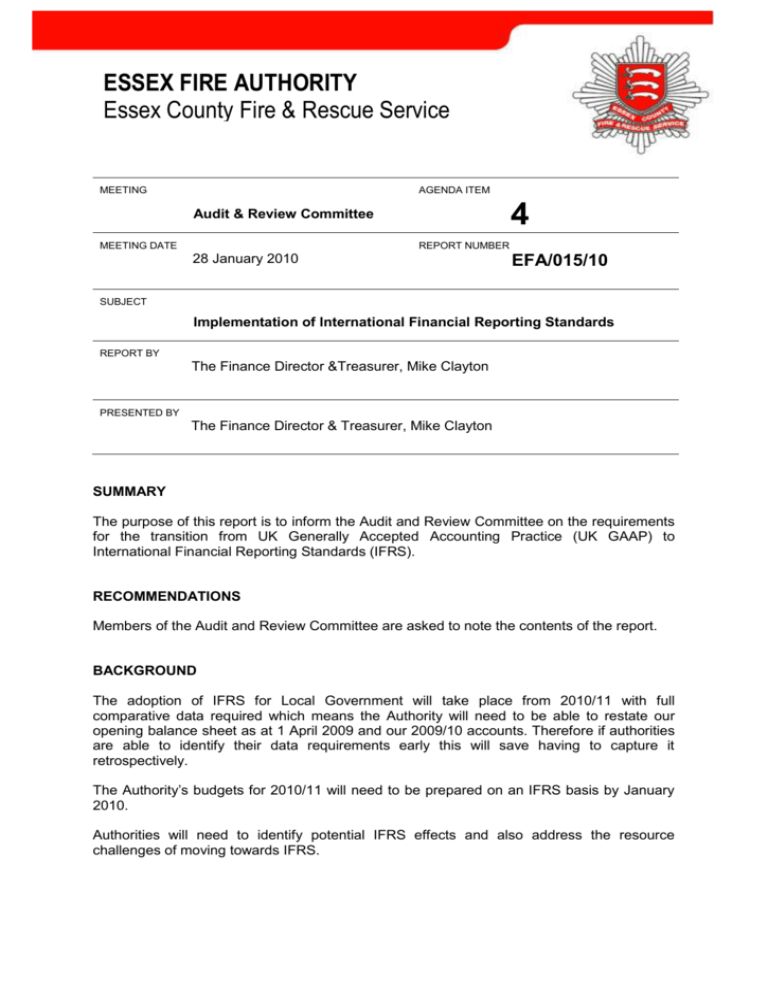
ESSEX FIRE AUTHORITY Essex County Fire & Rescue Service MEETING AGENDA ITEM 4 Audit & Review Committee MEETING DATE REPORT NUMBER 28 January 2010 EFA/015/10 SUBJECT Implementation of International Financial Reporting Standards REPORT BY The Finance Director &Treasurer, Mike Clayton PRESENTED BY The Finance Director & Treasurer, Mike Clayton SUMMARY The purpose of this report is to inform the Audit and Review Committee on the requirements for the transition from UK Generally Accepted Accounting Practice (UK GAAP) to International Financial Reporting Standards (IFRS). RECOMMENDATIONS Members of the Audit and Review Committee are asked to note the contents of the report. BACKGROUND The adoption of IFRS for Local Government will take place from 2010/11 with full comparative data required which means the Authority will need to be able to restate our opening balance sheet as at 1 April 2009 and our 2009/10 accounts. Therefore if authorities are able to identify their data requirements early this will save having to capture it retrospectively. The Authority’s budgets for 2010/11 will need to be prepared on an IFRS basis by January 2010. Authorities will need to identify potential IFRS effects and also address the resource challenges of moving towards IFRS. Agenda Item 4 Report EFA/015/10 Page 2 The impact of the standards The most significant areas of change for the Authority will be in the following areas: leases property, plant and equipment employee benefits; and disclosures. Leases Under IFRS the Authority will need to review arrangements they may have involving the use of an asset, such as a licence, partnership agreement on long term contract to consider whether they contain a lease. Information on any licences/agreements/rights to use which run or extend beyond 31 March 2010 will be identified and copies of documentation obtained by April 2010. Where the Authority leases land and buildings, International Accounting Standard (IAS) 17 Leases requires that the land and buildings elements are considered separately, with the land element usually treated as operating lease and the building element tested separately for a finance lease. Property Services are currently working on compiling a database of property lease details for this purpose. Property, plant and equipment IAS 16 Property, plant and equipment introduces different requirements for the basis of asset valuations. It states that each part of an item with a cost that is significant in relation to the total cost shall be depreciated separately, for example if a building has lifts and boiler system of significant cost and of different economic lives to the rest of the building, then those components should each be depreciated separately from the rest of the building. This will require asset registers to record separately those component parts of the asset, however National guidance on components has not yet been issued. Finance staff have met with Terry Appleby of Lambert Smith Hampton (property advisors to the Authority) and agreed that components and valuations will be provided as part of the 2010 valuation process. Employee benefits IAS 19 Employee benefits introduces the requirement that organisations accrue for staff benefits, including paid leave, that are not taken at the balance sheet date. The accrual may not be material to the accounts however authorities need to be able to demonstrate that they have undertaken sufficient analysis of this. A calculation of the accrual as at 31 March 2009 has been carried out, and an equivalent calculation will be carried out as at 31 March 2010. 2 Agenda Item 4 Report EFA/015/10 Page 3 Disclosures IFRS contains a significant number of additional disclosure requirements over UK standards which may require the capture of new and different data and authorities will need to consider how this will be achieved. Members of the Finance team have attended training on IFRS transition and will be monitoring the Authority’s progress throughout the transition period. Impact on 2010 Revenue Budget The changes to leases, property and plant will not impact on the Authority’s revenue budget in 2010. This is because non-cash adjustments such as depreciation are replaced for council tax purposes with the minimum revenue provision. Changes to the value of outstanding employee benefits will impact on the revenue budget. The movement in these liabilities is unlikely to be material whilst the leave year and leave levels remain unchanged. Project Plan The Finance Department has a project plan to manage progress in making the above changes as part of the 2009/10 year end accounts process. RISK MANAGEMENT IMPLICATIONS There is a risk that, should IFRS not be followed, the Authority’s accounts would not be compliant with the Statement of Recommended Practice (SORP). Also there is a risk that changes have a material impact on the Authority’s cost base and income and expenditure account. The implementation of the IFRS changes by CIPFA mitigate against this risk as most of the changes are reversed out when Council Tax is calculated. FINANCIAL IMPLICATIONS The work required for the transition to IFRS will come from the existing staffing resources in the Finance department and existing contractual arrangements with professional advisors. LEGAL IMPLICATIONS There are no direct legal implications from this report. LOCAL GOVERNMENT (ACCESS TO INFORMATION) ACT 1985 List of background documents Proper Officer: Contact Officer: Director of Finance & Treasurer Mike Clayton, Essex County Fire & Rescue Service, Kelvedon park, London Road, Kelvedon CM8 3HB 01376 576000 E-mail: mike.clayton@essex-fire.gov.uk 3

